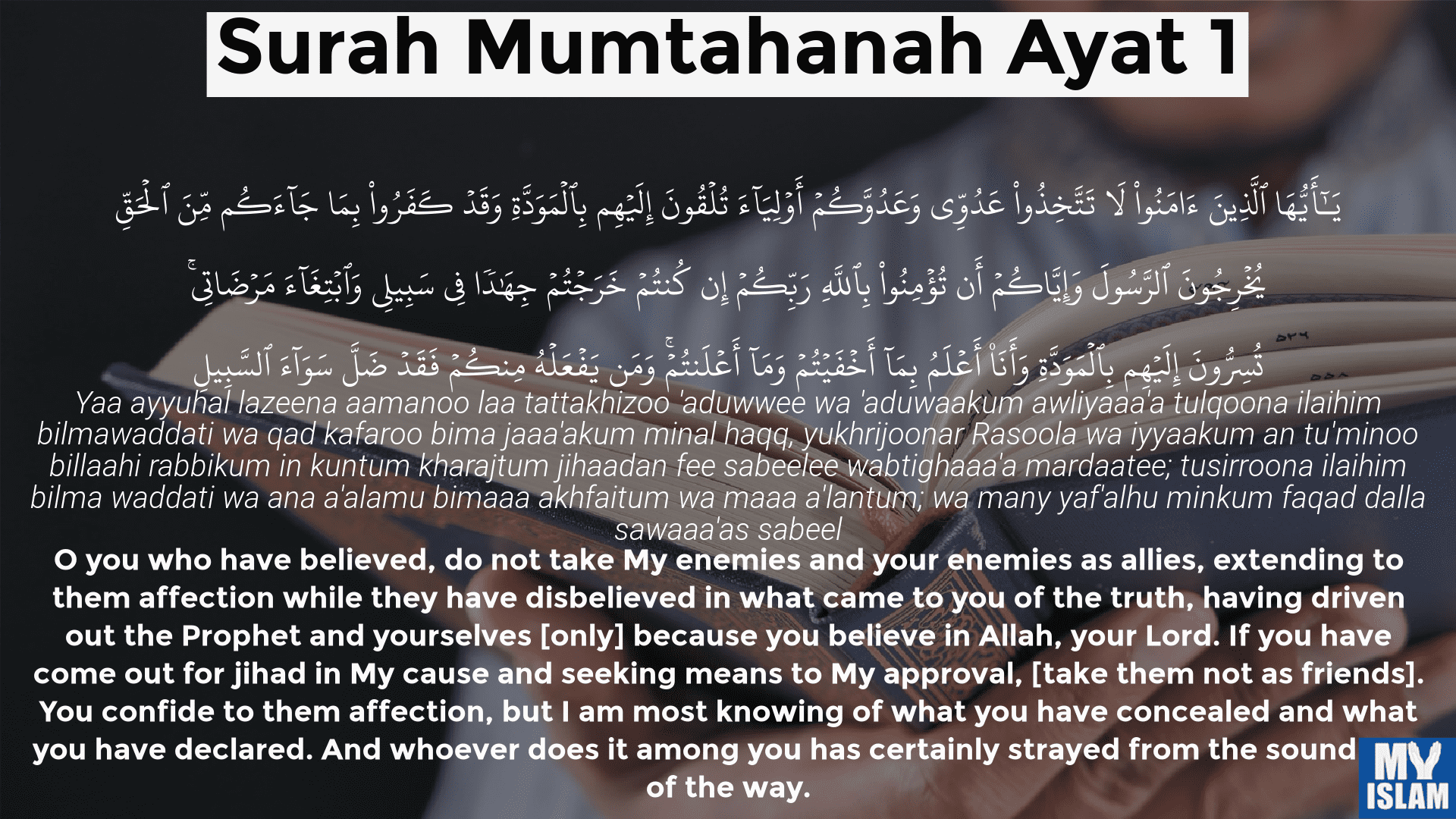Surah Mumtahanah Ayat 9 in Arabic Text
English Translation
Here you can read various translations of verse 9
Allah only forbids you from those who fight you because of religion and expel you from your homes and aid in your expulsion – [forbids] that you make allies of them. And whoever makes allies of them, then it is those who are the wrongdoers.
Allah only forbids you, with regard to those who fight you for (your) Faith, and drive you out of your homes, and support (others) in driving you out, from turning to them (for friendship and protection). It is such as turn to them (in these circumstances), that do wrong.
Allah only forbids you to be friends with those who have fought against you on account of religion and who have driven you out of your homes and have abetted in your expulsion. And any who make friends with them, they are the wrong-doers.
It is only as regards those who fought against you on account of religion, and have driven you out of your homes, and helped to drive you out, that Allah forbids you to befriend them. And whosoever will befriend them, then such are the Zalimun (wrong-doers those who disobey Allah).
Allah forbiddeth you only those who warred against you on account of religion and have driven you out from your homes and helped to drive you out, that ye make friends of them. Whosoever maketh friends of them – (All) such are wrong-doers.
Surely Allah only forbids you as to the ones who have fought you on account of the religion, and driven you out of your homes, and backed (others) in driving you out, that you should patronize them; and whoever patronizes them, then those are they who are the unjust.
But God forbids you to take as allies those who have fought against you for your faith, driven you out of your homes, and helped others to drive you out: any of you who take them as allies will truly be wrongdoers.
اللہ تعالیٰ تمہیں صرف ان لوگوں کی محبت سے روکتا ہے جنہوں نے تم سے دین کے بارے میں لڑائیاں لڑیں اور تمہیں شہر سے نکال دیئے اور شہر سے نکالنے والوں کی مدد کی جو لوگ ایسے کفار سے محبت کریں وه (قطعاً) ﻇالم ہیں
Quran 60 Verse 9 Explanation
For those looking for commentary to help with the understanding of Surah Mumtahanah ayat 9, we’ve provided two Tafseer works below. The first is the tafseer of Abul Ala Maududi, the second is of Ibn Kathir.
Ala-Maududi
(60:9) Allah only forbids you to be friends with those who have fought against you on account of religion and who have driven you out of your homes and have abetted in your expulsion. And any who make friends with them, they are the wrong-doers.[13]
13. The instructions to sever relations with the disbelievers given in the preceding verses, could cause the people the misunderstanding that this was because of their being the disbelievers. Therefore, in these verses it has been made clear that its real cause is not their disbelief but their hostility to Islam and their tyrannical treatment of the followers of Islam. The Muslims, therefore, should distinguish between the hostile disbeliever and the nonhostile disbeliever, and should treat those disbelievers well who have never treated them with evil. Its best explanation is the incident that took place between Asma, daughter of Abu Bakr, and her disbelieving mother. A wife of Abu Bakr’s was Qutaylah bint Abdul Uzza, who was a disbeliever and had remained behind in Makkah after the migration. Asma had been born of her. After the peace treaty of Hudaibiyah when the traffic opened between Makkah and Madinah, she came to Al-Madinah to see her daughter and also brought some gifts. Asma herself has related that she went to the Prophet (peace be upon him) and asked: Should I see my mother. And can I treat her as a daughter should treat her mother. The Prophet (peace be upon him) replied: Yes, treat her as your mother. (Musnad Ahmad, Bukhari, Muslim). Asma’s son, Abdullah bin Zubair, has given further details of this incident. He says that Asma in the beginning had refused to see her mother. Then, when she received Allah and His Messenger’s permission she met her. (Musnad Ahmad, Ibn Jarir, Ibn Abi Hatim). This by itself leads to the conclusion that a Muslim’s serving his unbelieving parents and his helping his unbelieving brothers and sisters and relatives is permissible when they are not hostile to Islam. Likewise, one can also spend his charities on the indigent among the dhimmis. (Al-Jassas, Ahkam al-Quran; Ruh al-Maani).
Ibn-Kathir
The tafsir of Surah As-Saff verse 9 by Ibn Kathir is unavailable here.
Please refer to Surah Saff ayat 7 which provides the complete commentary from verse 7 through 9.
Quick navigation links






